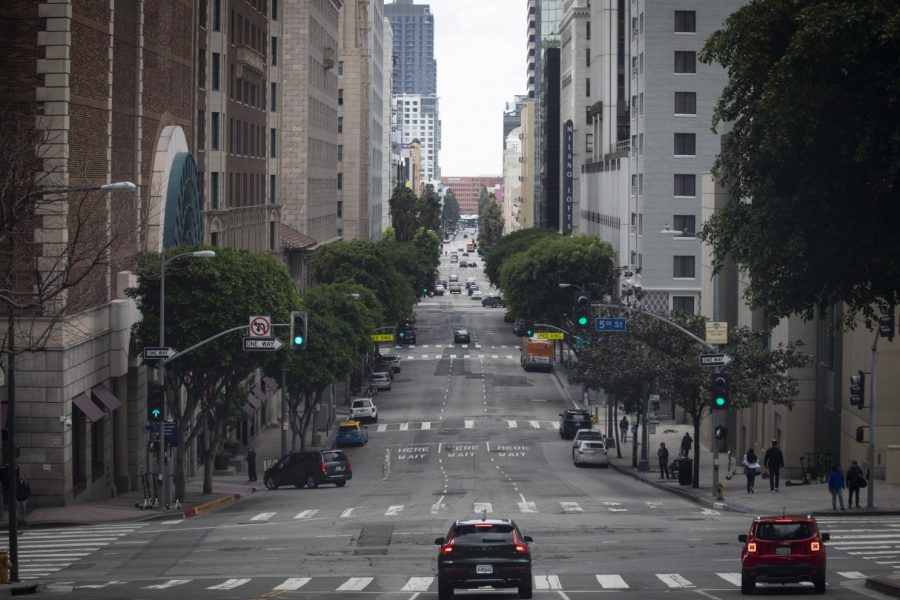California’s business lockdown should be lifted with additional public health measures put into place
Francine Orr/Los Angeles Times
Downtown Los Angeles’ usually bustling Grand Avenue sees light traffic during the lockdown.
June 4, 2020
On March 19th, amongst a surge of coronavirus cases rising within the United States, California Governor Gavin Newsom issued an order for Californians to stay at home, essentially putting a lockdown over the state’s civilian action. According to KSLA News, non-essential businesses were closed and Californians were encouraged to stay home except for acquiring essential services or performing essential work and were also ordered to practice proper social distancing. As stated by The Washington Post, California’s early and restrictive lockdown has definitely helped slow the rapid spread of COVID-19, allowing for a more manageable capacity within hospitals. However, it comes at a cost to the state’s economy and mental health and the government should aim to ease into removing restrictions to restore a normal workplace with additional public health measures.
Likely the most obvious effect of the lockdown can be seen in a suffering economy. Once-packed highways winding through Los Angeles lay barren as curfews and restrictions temporarily shut down businesses for employers and their employees. The New York Times shows the widespread ripple effect of social distancing, where the amount of potential spending money lost as civilians practice isolating themselves within their homes is illustrated in various interviews of business owners and workers alike whose finances were struck by the pandemic. Restaurants lose money as fewer customers ring the door to dine, also cutting the need for cooks and custodians. When sports leagues were cancelled, sports services began to feel the pinch as leagues like the NBA can no longer air.
While businesses continue to lose money, unemployment rates mount as employees are furloughed to cut costs. Government figures released by the Los Angeles Times reveal that, in May, the nation’s unemployment rate rose to 14.7% from the record-low 3.5% of pre-lockdown February. Although 18 million of April’s total 23 million unemployed have said that their layoff would be temporary, as consumers continue to withhold spending, more unemployment may become permanent instead if business owners see a further drop in profits.
Furthermore, the lockdown may have a more subtle effect on the mental health of a citizen. With the implementation of social distancing, self-isolation in homes, and a lockdown of businesses, day-to-day social and behavioral functions are being shut down and changing. According to KFF, during the pandemic, there is likely to be a widespread increase in anxiety, loneliness, and depression. This could be dire for civilians already experiencing mental illness or substance use disorders as isolation by social distancing could possibly exacerbate existing conditions.
In addition, the wave of job loss accompanying the lockdown could make feelings of anxiety among those under financial pressure increasingly common. Additional stress could follow concerns for family members potentially being infected by COVID-19. Moreover, as stated by JAMA Network, agitation and isolation within homes could lead to greater increases of domestic violence. The closing of schools could also see higher rates of child abuse as teachers and students are isolated.
Despite its drastic change to the economy and the more quiet change to mental health, doubts still linger on potential repercussions of releasing the lockdown too early. Bohan Bai (12) expresses her concerns on lifting the lockdown and stresses the continued growth of the pandemic. “Lifting the lockdown will only increase the amount of people infected,” she says. “More people getting infected is going to increase pressure on the hospitals and insurance companies. People will suffer more if they do end up catching the virus due to expensive hospital payments.”
It’s clear, however, that the focus on preventing the spread of the virus has been received with an immense economic decline that could take a lasting toll on the American economy, which could negatively affect citizens even further. With considerations of increased public sanitation in mind, legislators should soon target a reasonable date to lift the lockdown as its emphasis on isolation and the shutdown of businesses has negatively affected the economy and collective mental state of civilians.





































